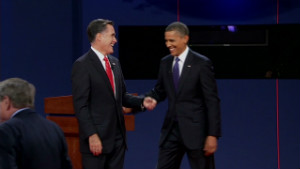Here are five things to watch for on Tuesday:
1. Connecting with the audience
Unlike the first
presidential showdown in Denver two weeks ago, this debate will include a
town hall audience of approximately 80 undecided voters, some of whom
will get the chance to ask questions to the two candidates.
It's a completely different dynamic than the first face-off between the president and the Republican nominee.
"The challenge is that
they've got to connect, not just with the people that are looking into
the television and watching them, but to the people that are on the
stage with them,
" the debate's moderator, CNN Chief Political Correspondent Candy Crowley, said.
" the debate's moderator, CNN Chief Political Correspondent Candy Crowley, said.
"They have to keep those
folks in mind. It's a much more intimate and up close adventure with
voters. The candidate that makes a connection with the person asking the
question is also making a better connection with the person back at
home," added Crowley, who's also the host of CNN's "State of the Union."
With no podium to hide
behind in Tuesday's debate, the candidates' style and body language will
be in the spotlight. If you don't think this matters, flash back 20
years to the first town hall-style presidential debate when
then-President George H.W. Bush repeatedly checked his watch. It was a
sign, some thought, that the incumbent would rather have been anywhere
else than debating Democratic challenger Bill Clinton.
2. Find a warm place
After a lackluster
performance in the first debate, it's obvious the president needs to
step it up in Round 2. Even Obama himself admits he was flat in the
face-off in Denver, telling ABC News, "I had a bad night."
The big question is how aggressive will the president be in this second showdown?
Obama needs to look like
a fighter. The normally cool president needs to heat it up, but he
can't come off looking overly aggressive or negative. That might smack
of desperation.
"Don't over-correct.
Don't go from being too passive in the first debate to too aggressive in
the second," Begala cautioned. "You need the Goldilocks Strategy: Not
as cool as the first debate, not as hot as Vice President Joe Biden."
3. Getting women's issues into the conversation
Obama pollster Joel
Benenson released a harshly worded memo on Monday attacking the Gallup
organization over a new poll, released in tandem with USA Today, that
showed Romney now tied with Obama among women voters.
You read that right.
After months of leading Romney by double digits among women, his lead
among female voters has effectively vanished, if you believe that poll.
Benenson savaged
Gallup's methodology and dismissed the poll as an outlier. He's correct
that no other survey has shown Romney performing that well among women.
But for Chicago's sake,
he better be right. Along with his impenetrable lead among Hispanics and
a near total hold on African-American voters, Obama has led Romney all
year thanks to his robust support among women. If that disappears, so do
the president's re-election hopes.
What does this mean for Tuesday night?
Women-specific issues --
topics like abortion, contraception, child care, education -- did not
come up at length in the first Obama-Romney showdown.
4. Strong performance pays off -- literally
A strong debate showing doesn't just move numbers, it raises money.
Romney's energetic
performance in Denver -- which voters judged as a clear win, polls
showed -- accomplished something very important for the Republican
nominee.
In short, his supporters now like him.
Before the debate,
according to a Washington Post/ABC News poll out Monday, fewer than half
of Romney supporters said they were "very enthusiastic" about his
candidacy. Today, the "very enthusiastic" number is up to 62% among
likely voters.
That's crucial for Romney, who needs a fired-up base of supporters to show up on Election Day.
But the more immediate
post-debate impact was financial: Romney raised more than $12 million
online in the 48 hours after Denver, his campaign announced just a few
days after the debate.
And if a campaign is
rolling out fundraising data before the federal deadline for financial
reports, you know they're feeling good.
On top of that, the campaign said it raised $27 million online from low-dollar contributors in the first two weeks of October.
5. Watch out for the wild card
The economy is still
issue No. 1 for voters in this election. Foreign policy and national
security have also crept into the discussion, with tensions in the
Middle East slightly eroding Obama's edge over Romney on the
commander-in-chief question.
But unlike in the
previous two debates, when editorial control rested in the hands of the
moderator, Monday's debate is a town-hall style forum, in which the
audience, about 80 undecided voters from Nassau County, will be the ones
generating questions for the candidates.
That means there's a
real chance Obama and Romney will have to talk about something that
might not have come up in their exhaustive debate prep sessions.
A question on
affirmative action? Funding for AIDS-relief efforts overseas? Guns? NFL
head-trauma? Is that Brody guy from "Homeland" really a terrorist?
Theoretically, anything
is on the table. The moderator, Candy Crowley, and her team will have
final say over the submitted questions.
But with regular people
in the mix, there's always potential for a wild card that could throw
one or both of the candidates off his game.
Culled: CNN
Edited:LII

No comments:
Post a Comment